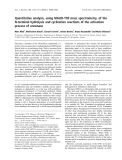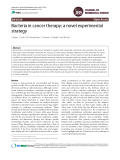
Antitumoral potential
-
Onconase, a member of the ribonuclease superfamily, is a potent cytotoxicagent that isundergoingphase II/IIIhuman clinical trials as an antitumor drug. Native onconase from Rana pipiensand its amphibian homologs have an N-ter-minal pyroglutamyl residue that is essential for obtaining fully active enzymes with their full potential as cytotoxins. When expressed cytosolically in bacteria, Onconase is isolated with an additional methionyl (Met1) residue and glutaminyl insteadof a pyroglutamyl residue at position 1 of the N-terminus and is consequently inactivated....
 9p
9p  dell39
dell39
 03-04-2013
03-04-2013
 33
33
 4
4
 Download
Download
-
Intermediate-risk patients are those with any of the following criteria: microscopic tumour invasion into the perithyroidal tissues at initial surgery, cervical lymph node metastases or 131I uptake outside the thyroid bed on the initial post-treatment scan, or tumour with aggressive histology or vascular invasion. Finally, high-risk patients have macroscopic tumour invasion, incomplete tumour resection, distant metastases or elevated thyroglobulin out of proportion to what is seen on the post-treatment scan (Cooper et al., 2009).
 398p
398p  wqwqwqwqwq
wqwqwqwqwq
 20-07-2012
20-07-2012
 108
108
 5
5
 Download
Download
-
There is an urgent need to develop new innovative therapies for the control of advanced cancer. The combination of antigen-specific immunotherapy with the employment of immunomodulatory agents has emerged as a potentially plausible approach for the control of advanced cancer. Methods: In the current study, we explored the combination of the DNA vaccine encoding calreticulin (CRT) linked to human papillomavirus type 16 (HPV-16) E7 antigen (CRT/E7) with the TLR7 agonist imiquimod for their ability to generate E7-specific immune responses and antitumor effects in tumor-bearing mice.
 9p
9p  toshiba23
toshiba23
 18-11-2011
18-11-2011
 58
58
 4
4
 Download
Download
-
Abstract Resistance to conventional anticancer therapies in patients with advanced solid tumors has prompted the need of alternative cancer therapies. Moreover, the success of novel cancer therapies depends on their selectivity for cancer cells with limited toxicity to normal tissues. Several decades after Coley's work a variety of natural and genetically modified non-pathogenic bacterial species are being explored as potential antitumor agents, either to provide direct tumoricidal effects or to deliver tumoricidal molecules.
 9p
9p  toshiba23
toshiba23
 18-11-2011
18-11-2011
 59
59
 2
2
 Download
Download
CHỦ ĐỀ BẠN MUỐN TÌM
















